Sudan
Sudan protest updates: December 2018 – February 1, 2019
June 19, 2019: Junta sends envoy to Nigeria
A top U.S. State Department official who deals with Sudan said on Tuesday that Washington was considering all options, including possible sanctions, if there was more violence after a deadly assault on protesters in Khartoum early this month.
“We’re looking at all options, including sanctions down the line should there be any kind of repeat of violence,” Makila James, deputy assistant secretary for East Africa and the Sudans, told a U.S. House of Representatives hearing.
She said they could include visa sanctions or economic sanctions. “We want to use the right tool and we want to target the right people,” James said.
Sudan’s ruling generals and an opposition coalition have been wrangling for weeks over what form a transitional government should take after the military deposed and detained long-time president Omar al-Bashir on April 11.
Talks between the two sides collapsed when security forces stormed a protest sit-in on June 3, killing dozens and prompting concern from world powers.
James told the House Foreign Affairs Africa subcommittee that Washington believes the best possible outcome in Sudan is an agreement between the military authorities and the opposition Forces for Freedom and Change, or FFC.
The State Department appointed a veteran diplomat, Donald Booth, as special envoy for Sudan on June 10.
James praised a mediation effort led by Ethiopia and said Washington had made clear “in very strong terms” that a unilateral military government would not be acceptable.
The United States sanctioned Sudan under Bashir over its alleged support for militant groups and the civil war in Darfur.
Trade sanctions were lifted in 2017 but Sudan is still on the U.S. list of state sponsors of terrorism, which prevents it from accessing badly needed funding from international lenders. Washington says Sudan will stay on the list until the military leaves power.
REUTERS
June 19, 2019: Junta sends envoy to Nigeria
Prior to the arrival of Lt. Gen. Jammal Eddin Ibrahim in Abuja, Nigeria on Thursday, the military junta in Sudan had largely engaged players in the region and gulf players.
An aide to Nigerian president Muhammadu Buhari posted pictures of the Sudanese Special Envoy on Twitter. He did not give any details as to what their discussions were about.
Lt. Gen. Jammal Eddin Ibrahim is currently the Sudanese Head of Security and Defence Committee. Back home the stalemate in talks between the junta and protesters continues with Ethiopian PM Abiy Ahmed expected to fly to Khartoum.
President
— Bashir Ahmad (BashirAhmaad) June 20, 2019MBuhariearlier today received Special Envoy from Sudan, the Sudanese Head of Security and Defence Committee Lt. Gen. Jammal Eddin Ibrahim at the Presidential Villa, Abuja. pic.twitter.com/4DvcC4yNFh
June 17-18, 2019: Night rallies, new tactic of protest movement
Sudan’s protest leaders earlier this week called for nighttime demonstrations and marches in the capital, Khartoum, and elsewhere in the country, amid a tense standoff with the ruling military over who should lead the transition after the ouster of the autocrat Omar al-Bashir.
The protest leaders said they’ve begun a “revolutionary escalation” to pressure the country’s generals to hand over power to civilians and to condemn the military’s violent dispersal of their sit-in camp in Khartoum earlier this month.
At least 128 people have died since the security force’s crackdown on June 3, according to the protest organizers. The military-backed authorities, however, say 61 people died, including three members of the security forces.
The group representing the protesters — known as the Forces for the Declaration of Freedom and Change — said the night rallies will begin on Tuesday and marches on Thursday.
AP
June 14, 2019: Junta leader in Eritrea
A Sudanese delegation on Friday arrived in neighbouring Eritrea for a working visit, the Eritrean Information Minister disclosed on Friday.
The delegation is led by Chairman of the Transitional Military Council, TMC; Abdul Fattah Al-Burhan. They were received by President Isaias Afwerki at the Asmara International Airport.
The two sides have since talks which are likely to center around bilateral relations and incidents back in post-Bashir Sudan.
Eritrea has in recent weeks been a vocal neighbour calling on the African Union to stop externalizing the crisis and then Afwerki’s visit to Egypt to hold talks on Sudan with Egyptian counterpart Abdel Fatteh Al-Sisi.
Eritrea was the only country in the region that the TMC leader had yet to visit in the last few months. Al-Burhan has alread been to Egypt, South Sudan and Ethiopia holding talks with the respective leaders.
Back home, despite the resumption of talks between the junta and protest leaders; the call for a third party is the latest stumbling block to the talks. Protesters are also demanding a probe into deaths from a violent break up of a sit-in.
The Chairman of Sudan’s Transitional Military Council (TMC), Lt. Gen. Abdul-Fattah Al-Burhan, arrived in Asmara in mid-morning hours today for working visit to #Eritrea. Delegation was accorded warm welcome by President Isaias Afwerki on arrival at Asmara’s International Airport. pic.twitter.com/zGvV88o1sw
— Yemane G. Meskel (@hawelti) June 14, 2019
June 4, 2019: German envoy talks tough at special UNSC meeting on Sudan
The United Nations Security Council called an emergency meeting to discuss events in Sudan after a deadly attack by security forces on protesters in Khartoum on Monday.
One of the biggest pronouncements from the stakeout of the session was by the German envoy Ambassador Heusgen who warned against the use of force in a bid to achieve legitimacy.
“Legitimacy cannot come from the barrel of a gun,” the German Mission to the UN quoted him in a tweet.
Whiles expressing “deep concern over violence against protesters in #Sudan. He stresses the urgent need for a return to the negotiation table to bring about an inclusive, civilian-led transitional gov’t,” the tweet added.
The June 3 attack led to the deaths of over 30 people whiles over 100 are reported to have sustained varied degrees of injuries. Protest leaders have vowed to escalate their push for civilian transition.
Hours after the deadly removal of a sit-in by predominantly Rapid Special Forces, RSF, with the backing of other militia, the junta that deposed Omar Al-Bashir has scrapped previous agreements with protesters.
The Abdul Fattah al-Burhan-led junta has also scheduled elections in nine months time, a time frame totally rejected by the protest leaders.
The junta initially called for two-year transition. It later agreed a three-year period in what is now scrapped legislative deal with the protest leaders.
Post-Bashir Sudan has proven to be a very difficult period as the country grapples with the aftershocks of a revolution that many believe is experiencing a counterrevolution engineered from outside the country by powerful players in the Gulf region – Saudi Arabia, United Arab Emirates and Egypt.
On the situation in #Sudan: We are deeply worried about developments in #Khartoum. Violence against protesters cannot be justified and has to stop immediately. We call on parties to avoid escalation and to return to the negotiating table.
— GermanForeignOffice (@GermanyDiplo) June 3, 2019
June 3, 2019: Violent break up of Khartoum sit-in
Security forces stormed a protest camp in the Sudanese capital Khartoum on Monday and opposition-linked medics said more than 30 people were killed in the worst violence since the overthrow of President Omar al-Bashir in April.
Footage shared on social media and verified by Reuters showed chaotic scenes of people fleeing through streets as sustained bursts of gunfire crackled in the air during violence that drew rapid Western and African censure.
Witnesses said a sit-in next to the Defence Ministry, the focal point of anti-government protests that started in December, had been cleared. Protesters poured onto streets elsewhere in Khartoum and beyond in response, setting up barricades and roadblocks with rocks and burning tyres.
A group of doctors linked to the opposition said 30 people had been “martyred” in Monday’s violence, with the toll expected to rise because not all casualties had been accounted for. The group had earlier said at least 116 people were wounded.
The main protest group accused the ruling military council of perpetrating “a massacre” as it broke up the camp.
The Transitional Military Council (TMC) denied that, with a spokesman, Lieutenant General Shams El Din Kabbashi, telling Reuters security forces were pursuing “unruly elements” who had fled to the protest site and caused chaos.
“The Transitional Military Council regrets the way the situation unfolded, reaffirming its full commitment to the … safety of the citizens and renews its call for negotiations as soon as possible,” the council later said in a statement.
Monday’s violence is likely to deal a blow to hopes for a restart to stalled talks and a negotiated settlement over who should govern in a transitional period after Bashir’s overthrow.
Sudan’s public prosecutor on Monday ordered an investigation into the violence, state news agency SUNA said.
Early June 2019: Mass protest demanding transition
Tens of thousands of Sudanese demonstrators converged on central Khartoum on Thursday night demanding civilian rule amid increasing tensions with the country’s military rulers who accused a protest encampment of threatening stability.
The protest, which followed a two-day strike organised by demonstrators and opposition groups frustrated by a deadlock in talks on a transition to democracy, underscores the volatility of the situation in Sudan nearly two months after the military overthrew autocrat Omar al-Bashir.
The head of the central Khartoum military region accused “unruly elements” of attacking a vehicle used by the paramilitary Rapid Support Forces (RSF) and seizing it near the protest site.
“The protest site has become unsafe and represents a danger to the revolution and the revolutionaries and threatens the coherence of the state and its national security,” General Bahar Ahmed al-Bahar, head of the central region in Khartoum said in a statement he read on television.
REUTERS
May 23, 2019: Hemedti in Saudi, stalemate back home persists
The two leaders of the Transitional Military Council, TMC, were in the news for different reasons on Thursday. Deputy head of TMC Mohamed Hamdan known as Hemedti arrived in Saudi Arabia for an official visit.
He was met on arrival in Jeddah by Prince Khalid Faisal. Saudi has been blamed as one of the interferers in ongoings back in Sudan. They have since Bashir’s overthrow made financial support available to Sudan.
Back home an opposition concession in transition talks was said to have been rejected by the TMC.
A journalist closely following the talks, Yousra Elbagir said the coalition had offered the TMC leader, Abdul Fattah al Burhan the role of leader of the sovereign body that was to lead the three-year transition.
But the TMC’s rejection was on the grounds that the coalition wanted a civilian Burhan to be leader – in which case he was expected to retire from the Army in order to hold the post. Neither the coalition or TMC have confirmed the report.
“On negotiations, inside source tells me: “[Opposition] Coalition made a major concession: they offered to agree to Burhan being President/Head of the Presidential Council – on the condition that he retire from the Army. It was flatly rejected [by Transitional Military Council]” she sad in a tweet.
Vice Chair of the Transitional Military Council, Mohamed Hamdan “Hemedti” arrives to Jeddah, Saudi Arabia today and met by Prince Khalid Faisal. pic.twitter.com/YDGsFIcj27
— Yousra Elbagir (@YousraElbagir) May 23, 2019
May 16, 2019: Roadblock removal starts, US lawmakers demand more pressure on junta
The removal of roadblocks in parts of the Sudanese capital, Khartoum, has started according to multiple reports.
The many roadblocks that had crippled movement across Khartoum led to the suspension of civilian-led transition talks between the military junta and protest leaders.
The military said it had suspended the talks for 72 hours effective Thursday morning. The protest leaders hit back at the move describing it as a surprise tactic by the military.
Nile Street is now officially open, after protesters clear barricades.
Fb live stream:.https://t.co/qhzEeDabTj
— Yousra Elbagir (@YousraElbagir) May 17, 2019
Meanwhile, a group of United States Senators have reiterated a call for America to stand with the Sudanese people in their fight to achieve a democratic country.
In a May 16 letter to the U.S. Secretary of State and Secretary of the Treasury, the 92 bipartisan lawmakers said: “This is a critical moment for Sudan, one that came about because of the Sudanese people took to the streets to demand it.
“It is also critical for the United States to support Sudanese citizen’s demands for real democratic change.” The protests that started since December 2018 has led to the ouster and arrest of long serving Omar al-Bashir.
May 16, 2019: Roadblock removal blocks transition talks
Days after the military and protest leaders agreed on a deal to lead Sudan out of a post-Bashir political flux, there is a new headache in the form of mounted roadblocks.
The Transitional Military Council, TMC, is calling for all roadblocks particularly in a designated area in the capital to be removed.
The measure had been one of the effective means that protesters have used in pressing for their demands. Vehicular movement has been largely restricted due to the roadblocks.
Protesters have also camped around these roadblocks as part of a sit-in around the premises of the military headquarters. Attempts to forcibly remove the roadblocks have failed despite claiming lives of some protesters and a security official.
The two parties have agreed for a three-year transition period to a civilian administration. The opposition alliance would have two-thirds of the seats on a legislative council. The sticking point is about who gets what number of seats on the sovereign council.
May 15, 2019: South Sudan president comments on crisis
The military junta that deposed Omar al-Bashir have agreed a deal transition deal with the opposition alliance. This follows weeks of back and forth over post-Bashir Sudan.
How long: The two parties have agreed for a three-year transition period to a civilian administration.
Legislative make up: The Transitional Military Council (TMC) disclosed that the alliance would have two-thirds of the seats on a legislative council.
TMC & opposition joint presser now:
They have agreed on a transitional period of three years & a legislative council comprising of 300 members, 67% will be signatories of the Declaration of Freedom & Change and 33% will not.
No mention of composition of ruling council.
— Yousra Elbagir (@YousraElbagir) May 14, 2019
Sticking point: the configuration of a sovereign council is what remains outstanding. The military and civilians have disagreed on who gets majority of seats on the council.
The last time the military made concessions on the issue, they said the best they could do was to allow for equal representation.
May 14, 2019: South Sudan president comments on crisis
President Salva Kiir of South Sudan has asked that the sovereignty of Sudan be respected in this time of political uncertainty as the country works towards a transition.
“It is important to remind international and regional actors not to interfere in Sudan. The people of Sudan are perfectly capable of managing their own affairs. Let us prove the world wrong.
“We are not war mongers, we are peace loving people and we are a proud and dignified nation,” he said on Tuesday during the opening of the second session of the South Sudan parliament in Juba.
Meanwhile, over in Sudan, post-Bashir flux continues. Transition deadlock between the junta that ousted Bashir and protest leaders is reportedly making headway.
The Khartoum sit-ins that have crippled movement in key areas of the capital continues. Reports indicate that in the second city Omdurman, protesters have blocked roads after deadly clashes on Monday in Khartoum.
May 13, 2019: Sudan’s military and opposition agree on power structure
Sudan’s military council and opposition groups have agreed to a power structure for the country’s transition but have yet to decide how long it will last or the make-up of transitional bodies, the council’s spokesman said on Monday (May 13).
Protesters are pushing for a civilian-led transition and have kept up demonstrations against the council since military officers removed Bashir, who is now facing multiple criminal investigations, from power.
On Monday they blocked roads in central Khartoum in an escalation of tactics after security forces used tear gas to disperse dozens of protesters across the Nile in Khartoum North, Reuters witnesses said.
On day two demonstrators blocked Nile Street, a major avenue running south of the Blue Nile, placing burning branches and stones across the road.
The military-civilian balance of power and the length of the transition have been key sticking points in talks between the council and an alliance of protest and opposition groups since former President Omar al-Bashir was ousted on April 11.
REUTERS



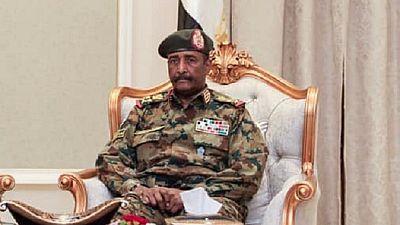


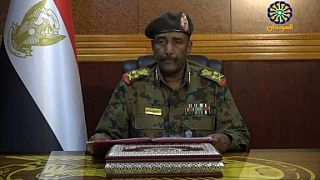
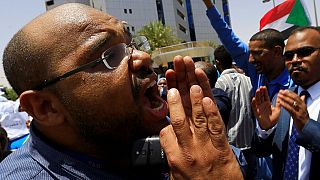
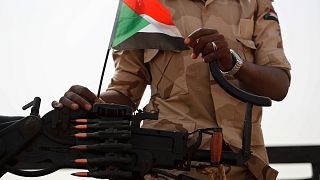
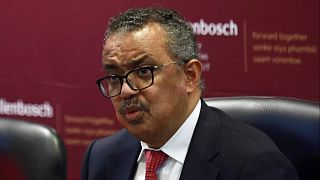
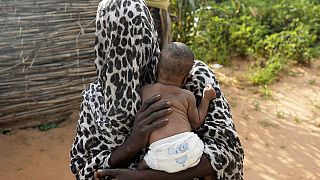



01:05
Ethiopia's mega-dam on the Nile is "now complete", Prime Minister says
01:49
Sudanese refugees in Chad face deepening humanitarian crisis
01:13
DRC and Rwanda to sign peace agreement on 27 June
01:41
UN warns of looming famine in Sudan, Gaza and 3 other global hunger hotspots
01:49
UN warns of impact Sudan's humanitarian crisis is having on Chad
Go to video
Sudan: Hamdok not convinced by the new Prime Minister